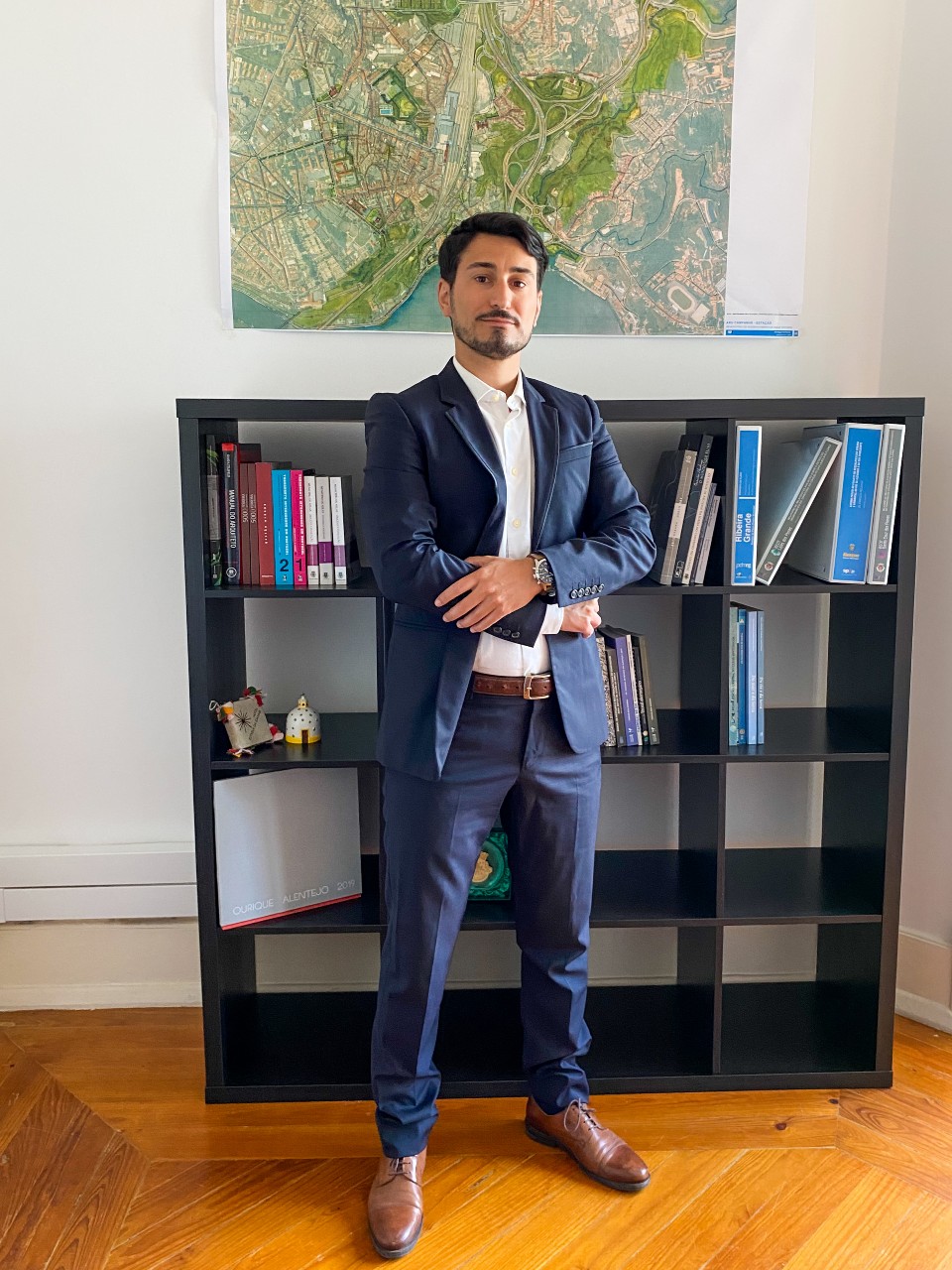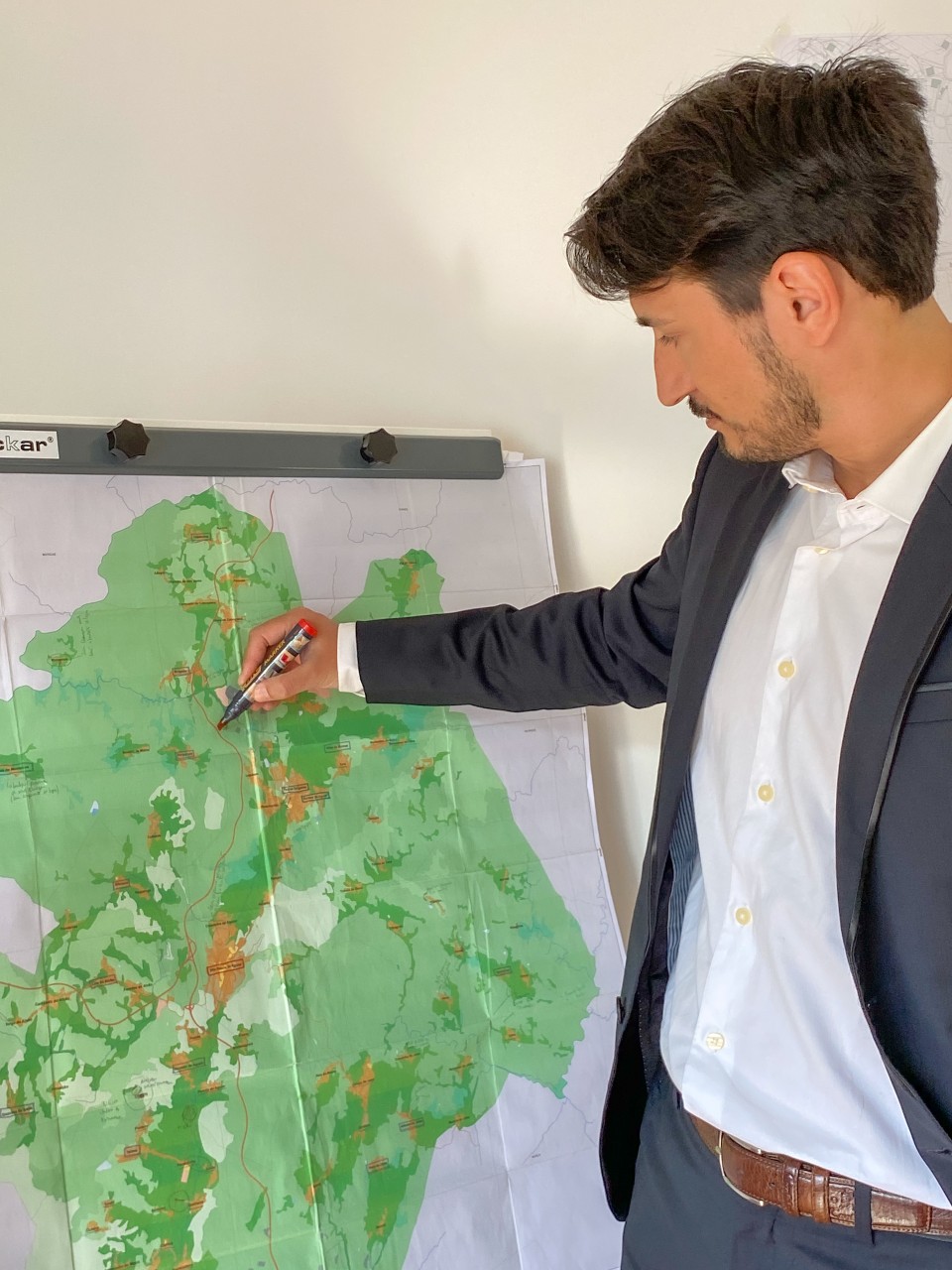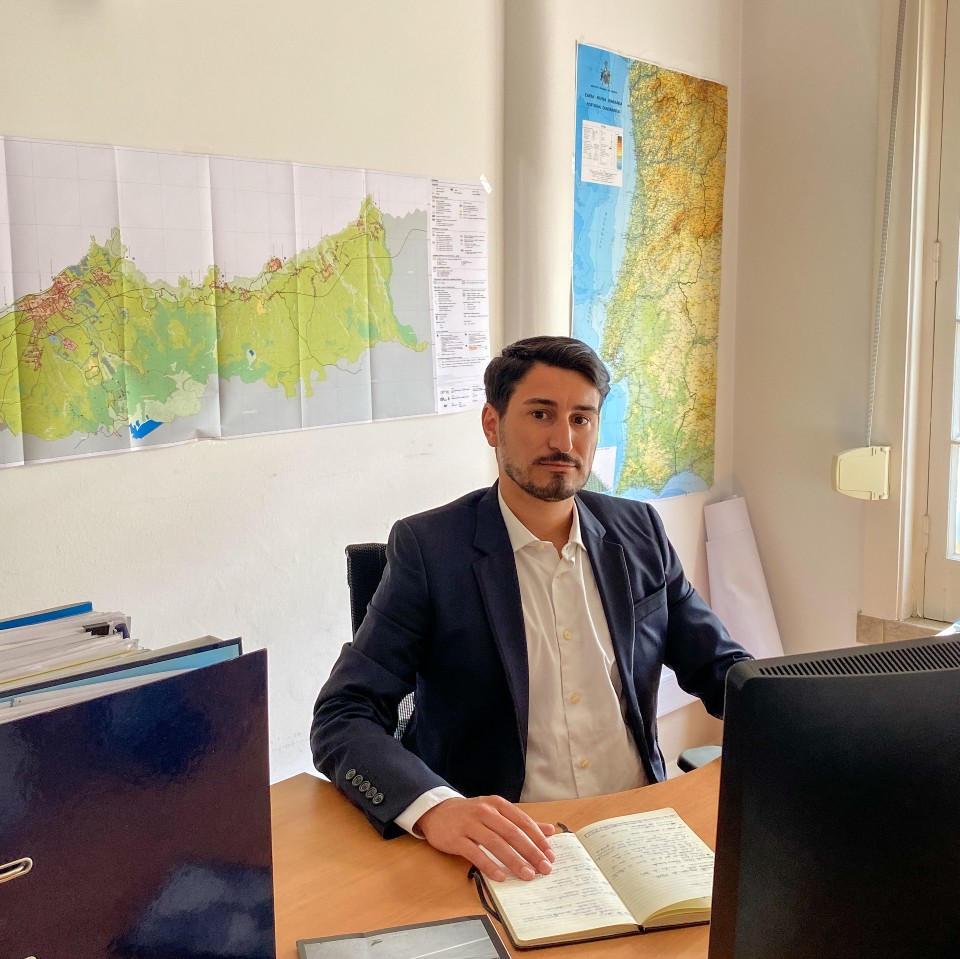
Nuno Andrade
Consultant at SPI - Sociedade Portuguesa de InovaçãoWith a career that includes, essentially, regional and urban development, Nuno Andrade is a territorial development consultant for national and international projects at SPI - Sociedade Portuguesa de Inovação.
Nuno Andrade has always shown a great interest for the study of the territory, as well as for the impact of the physical and human components that constitute it. Currently he is dedicated to the development of strategies for the implementation of Smart Cities, analyzing the applicability of new technological solutions to support territorial management at the municipal level.
With a degree in Physical Geography, master in Urban and Spatial Planning and a post-graduate degree in Smart Cities, Nuno Andrade is one of the special guests in Connecting Stories by PARTTEAM & OEMKIOSKS.
1. Can you tell us about your journey and your professional experience, as well as the functions you currently perform?
I am currently a senior consultant at Sociedade Portuguesa de Inovação (SPI), working for the Public Administration sector, in the Territory area, particularly in territorial development projects, strategic planning and territorial management instruments. I have been in this company for 7 years, where I found the opportunity to develop my knowledge in the area of Territorial Development and also an experienced and knowledgeable team. This framework has been fundamental to my progression, to which I add the importance of the diverse context of projects and "geographies" where we develop them – I venture to say, perhaps by default, that we collaborate with more than 50 municipalities from all regions of Portugal, to which we add the collaboration with associations and intermunicipal communities.

I would say that this knowledge of different realities and socio-economic contexts has been the basis of my progression as a consultant in this area. Also, and already as a team, we have benefited from a positive conjuncture of work opportunities, provided, in the first instance, by the challenges that cohesion policies defined by the European Union and its member states cyclically pose to regions and local authorities, but also by the need for external support that many of the portuguese municipalities have in view of the multiple competencies they have in the administrative management of the territory.
Just to finish this subject, we have had the opportunity to develop some projects funded by the European Union and the Inter-American Development Bank, which made us get to know new work cultures and territorial challenges that make us develop new approaches to action.
2. How did you become interested in studying the territory and all its components?
Although it may sound a bit cliché, this interest arises since I was a child. The truth is that since I was young I was involved in local associations linked to sports and culture and, as such, I was gaining a relationship with the associative movement and with the importance that the local community has in promoting change in local actions. I also come from a city (Ovar), where these associative movements are quite strong and have always been united in the defense of causes that affected the local population. As such, this close relationship and the context in which I was inserted contributed to this interest in the public cause.
It is important to mention that, as I grew older and became more mature in understanding certain issues and problems that contribute to and/or affect the development of “the land”, I began to realize what path I would have to follow (if I wanted to be an agent of change) and, as such, what scientific areas I would have to know and master. I think that's where this interest came from.
3. How, in your opinion, does SPI - Sociedade Portuguesa de Inovação contribute to the development of Smart Cities?
SPI, namely due to its structure and areas of expertise, has been contributing to the development and implementation of this concept, mainly in Portugal, but not only there. Given our positioning with portuguese local authorities, in supporting the definition of territorial development strategies, we suggest actions that allow the development and implementation of technological solutions for sustainable and intelligent management of the territory.
We were also at the genesis of the Implementation Plan and monitoring of the installation of one of the first living labs for decarbonization in Portugal, implemented with the support of the Environmental Fund in the town of Alenquer, and which, in essence, is based on the assembly of an integrated system and aggregator of technological solutions to meet the challenges of the population in the thematic areas of mobility, energy, buildings, circular economy and environment, involving people in the process of co-creation. In other words, the principles underlying the Smart City concept.
We are also involved in several projects of Horizon 2020, funded by the European Union, in the theme of “Smart Communities and Cities”. Being projects with a strong focus on innovation and testing, in order to be scaled and replicated in other territories, they allow an in-depth study of the theme and allow us to know the associated challenges and gain a better capacity to respond to them.
4. How can territorial management and Smart Cities improve the quality of life of the population?
I interpret this question in the sense of understanding how a Smart City environment can contribute to better land management. Thus, we have to keep in mind that the purpose of territorial management, in terms of planning and operationalizing land use and occupation, its functions, and the programming of equipment and installation of services, is precisely that – to guarantee that the population has democratic and efficient access to a set of goods and services that satisfy their most basic needs. That is, in the broad sense of the word, to guarantee quality of life for the population. For this management to be effective, it must be based on a deep knowledge of the characteristics of the territory, but also, and above all, it must know the behavior and needs of the population, in order to ensure that these are guaranteed.

A territory management based on a Smart City environment ends up facilitating these diagnostic tasks. In fact, it is with this purpose that we have evolved in this area, taking advantage of the development of new technologies to obtain more data and better information about the city and the citizen, enhancing the capacity of urban analytics. And, in my opinion, a municipal team that is better informed and aware of the problems can decide and act in a more assertive way to solve them.
5. Are sustainable development and Smart Cities related? In what way?
Yes, there is indeed a relationship between the two, especially because the main goal of implementing a Smart City is to promote and contribute to sustainable development, especially in terms of increasing energy efficiency and reducing emissions of pollutants. The truth is that for several decades we have been discussing the need to have a society that opts for more sustainable growth, with respect for the environment, with an efficient management of resources and without compromising future generations. However, only recently, and in connection with the climate crisis, have these concerns entered the political agendas and, as such, the search for concrete solutions that help minimize the problems has increased.
Thus, one cannot ignore the fact that, in recent years, there has been a great deal of technological development. This fact has fostered the creation of innovative solutions that allow a more efficient use of resources and that can be applied to our daily lives. These are the solutions that promote society's digital transition, that have been transposed to cities and that allow a Smart City to be implemented in order to achieve sustainable development.
6. How is the development of Smart Cities in Portugal?
This question is quite pertinent, even more so because I am answering days after the death of Dr. Almeida Henriques, a mayor who played a leading role in promoting and discussing the topic in Portugal and who should be referenced for that. The truth is that, despite the existence of a set of portuguese municipalities that have taken the initiative to create their strategy and implement a set of technological solutions, and the existence of a portuguese Smart Cities network and the Smart Cities Portugal Cluster, strategically there is still no common vision in Portugal, with concrete objectives, as well as an action plan to support the implementation of Smart Cities at local level.
We have seen, in recent times, specific initiatives from some portuguese cities, and it is even relatively easy to identify the leading municipalities in this field, which is to be highlighted, as they have contributed to the development of technologies and to the testing of solutions. However, the synergies generated are not being absorbed by others and the sharing of experiences is quite limited. Thus, I would say that there are currently some challenges for the success of these initiatives in Portugal, including the need to define a framework for interoperability and common principles between municipalities, to plan the solutions in an integrated manner, to optimize the public investment associated with the acquisition of intelligent systems and to scale up the small-scale pilot projects to other territories. Despite these challenges, it is to be expected that in the coming years, not least because of the opportunities that European structural policy will bring, municipalities will focus on the development of a Smart City.
7. How do you think the cities of the future will be?
Sometimes it's a complicated exercise to do, because in Portugal we don't see urbanization phenomena so intensely, even because most of the portuguese territory is in demographic decline and the growth of metropolitan areas is not so evident. However, the examples we currently have of megacities scattered all over the world and the rapid urbanization that has taken place in asian cities show that there have been no limits to the human being's ability to develop and invent cities. In addition to this, we have the United Nations projections that point to a scenario where 68% of the world's population will reside in urban areas by 2050, that is, we will have a high population density in these places, which is associated with a high demand for resources and significant waste production.

It is important to keep in mind that cities are very dynamic systems and, with what we are currently seeing, I believe that the future will bring us more advanced cities in terms of physical and technological infrastructure, allowing greater interaction between citizens and their surroundings. On the contrary, and maintaining the current dynamics, I also foresee that we will see an increase in social asymmetries between residents and the emergence of major challenges for the management of urban areas, whether in terms of mobility, energy consumption or waste management. Now, as a society, we are more aware of these realities and of the challenges to which large cities are exposed and, as such, we should strive to reverse the trends highlighted, promoting greener, decarbonized and inclusive cities.
8. How can new technologies contribute to a better efficiency in the management of urban areas?
Currently there are several successful examples of the application of new technologies to support the management of urban areas. These technological solutions, integrated in a Smart City environment, have contributed to provide more efficient services to citizens and to monitor and optimize existing infrastructures. However, the great progress comes with the evolution of the Internet of Things (IoT), where physical objects have gained the ability to collect and transmit data.
For the management of urban areas, the ability to obtain concrete data from the various physical elements present in the territory was preponderant. This is because management is very much about monitoring systems, evaluating their performance and taking decisions to make them more efficient and, as such, is dependent on accurate data and information. With technological evolution comes the ability to collect and manage a greater volume of data, to obtain information about urban systems on a regular and accurate basis, which allows for better informed decisions and to act in the management of the city in a more appropriate way. It is from this moment that a new paradigm is generated in municipal management teams, leading to the creation of the first urban intelligence and operation centers.
9. Being PARTTEAM & OEMKIOSKS a company that has the possibility to produce digital billboards, multimedia kiosks and other technological solutions for Smart Cities, and considering that the marketing and advertising sector has the greatest potential to adopt these equipments, what is the contribution of this sector to Smart Cities?
When I was invited by PARTTEAM & OEMKIOSKS to discuss this theme, I inevitably had to analyze your products and, in fact, you present very interesting solutions for the implementation of a Smart City system. Your solutions gain particular relevance in this context, because they ensure the contact between people and the system, that is, they are facilitators of access to the digital environment. And this is a fundamental component of a project of this type. In fact, I haven't had the opportunity to mention it before, but the success of the implementation of a Smart City depends on the acceptance of technologies and the collaboration for their development by the citizen.
Regarding the specific issue, it should be noted that the marketing and advertising industry is one of the sectors that directly benefits from the sharing of user data, being able to accumulate information about their routines, preferences, shopping habits and general behavior of citizens, allowing more targeted advertising actions and response, in a more concrete way, to consumer desires. In another perspective, it also has the ability to deliver messages to citizens and/or potential customers anywhere, anytime, through any medium that has a display.
In this context, there is one issue that cannot be avoided and that is privacy issues. Since trust is a vital pillar of the Smart City system, it is important that the companies collecting the data use it carefully, keeping citizens comfortable with the use of their data.
Finally, and regarding data ownership, it is also important to mention that the sharing of information with the city management authorities is fundamental, because only in a collaborative environment can an efficient management of the city be achieved. Therefore, I would say that the main contribution that this sector can make to the implementation of Smart Cities is to ensure user confidence and information sharing.
Connecting Stories is an editorial space led by PARTTEAM & OEMKIOSKS which consists of conducting exclusive interviews, directed at influential personalities who work in different sectors of activity.
The project, conceived by PARTTEAM & OEMKIOSKS, includes the publication of success stories, through small interviews with influencers who want to share details about their projects, opinions, plans for the future, among other subjects.
The idea is to connect stories, share knowledge, develop networking and generate content that can provide new visions, opportunities and ideas.
Founded in 2000, PARTTEAM & OEMKIOSKS is a world renowned Portuguese IT company, manufacturer of indoor and outdoor multimedia kiosks, self-service equipment, digital billboards, interactive tables and other digital solutions, for all types of sectors and industries. To know more about our story, click here.
